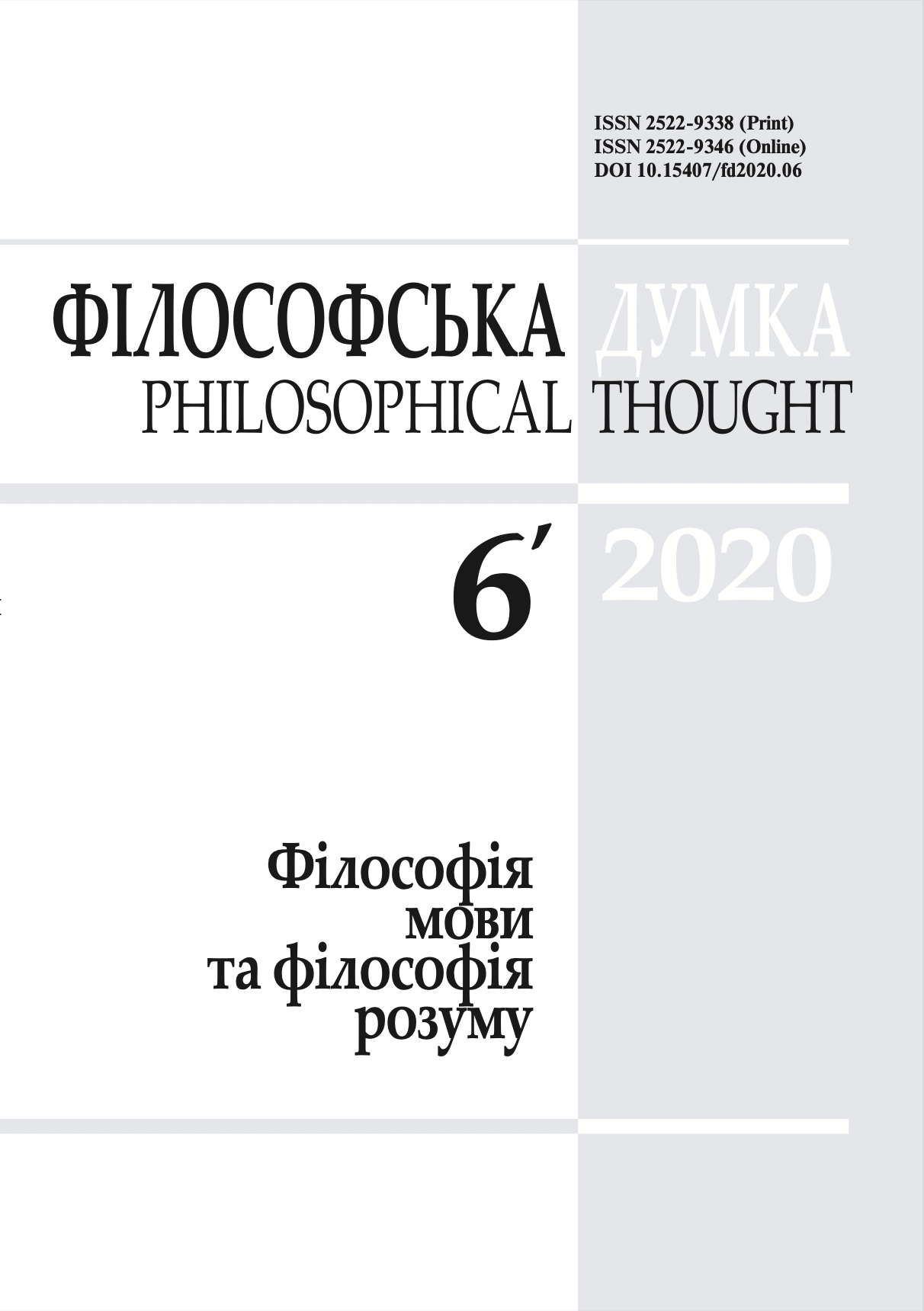Subject and subjectivity: V. Descombes VS S. Laugier
Analytics of subjectivity and intersubjectivity
DOI:
https://doi.org/10.15407/fd2020.06.042Keywords:
subject, actor, subjective privilege, reflexive paradigm, grammatical analysis, practical subjectivity, skeptical subjectivity, internal, external, expression, language, knowledgeAbstract
Despite the general applicability of philosophical concepts of the subject and subjectivity among philosophers, there is no unanimity in their understanding, even if we are talking about representatives of one philosophical trend. The subject of this article is the different understandings of subjectivity by two well-known French authors of analytical inspiration, V. Descombes and S. Laugier, which are united by the critique of the reflexive subject of the philosophy of mind, defending the idea of social mental nature, as well as appeal to the methodological resources of later Wittgenstein’s philosophy to develop the idea of a social subject. Despite their common attitudes, Descombes and Laugier are inspired by different traditions — Descombes, in general, develops the ideas of the French School of Sociology, while Laugier works in line of linguistic phenomenology, defined by the ordinary language philosophy and skeptical interpretations of Wittgenstein’s thought. Descombes builds the conception of the subject as an actor, formed not by his inside world, but by his action, the model of which is the institution of social life.
Descombes’s practical subjectivity grows out of his critique of the reflexive paradigm of the philosophy of mind (consciousness) and is the actor’s ability to take the responsi- bility for his own actions. Instead, Laugier’s concept of «depsychologized subjectivity » focuses on the other side of the actor’s ability to act following some rule within the insti- tutional paradigm of practice, namely the fragility and vulnerability of any human action, its defeats and difficulties, and the subject’s reluctance to be an actor and take the respon- sibility for his actions. Laugier defends the skeptical understanding of subjectivity as a property of the action of the delocalized subject of language and knowledge, his ability even by his inability to express the social naturalness of the human way of life.
References
REFERENCES
Austin, J.L. (1969). Other Minds. In : Philosophical Papers, Oxford : Oxford University Press. Austin, J.L. (2003). A Plea for Exuses. In: Classics of Analytis Philosophy. Ed. by R.R. Ammerman (рр. 372-399). Indianapolis : Hackett Publiching Company, Inc.
Cavell, S. (1979). The Claim of Reason. Oxford : Oxford University Press.
Descombes, V. (1990). Philosophie par gros temps. Paris : Minuit.
Descombes, V. (2004). Le complément de sujet. Enquête sur le fait d’agir de soi-même. Paris : Gallimard.
Descombes, V. (2002). Wittgenstein face au paradoxe de Moor. In : Wittgenstein, dernières pensées. Sous la dir. de J. Bouveresse, S. Laugier, J.-J. Rosat (рр. 207-236). Marseille: Agone. Descombes, V. (2007). Les institutions du sens. [In Ukrainian]. Kyiv : Ukrainian Center of spiritual culture.
Descombes, V. (2013). Exercices d’humanité. Dialogue avec Philippe de Lara. Paris : Les petits Platons.
Laugier, S. (2001). La pshychologie, la subjectivité et la voix intérieure. In : Les mots de l’ésprit. Sous la dir. de C. Chauviré, S. Laugier et J.-J. Rosat (рр. 46-60). Paris : Vrin.
Laugier, S. (2002). Le sujet de la certitude. In : Wittgenstein, dernières pensées. Sous la dir. de J. Bouveresse, S. Laugier, J.-J. Rosat (рр. 237-264). Marseille: Agone.
Laugier, S. (2007). Subjectivité et agentivité. In : Vincent Descombes. Les questions disputées (рр. 107-150). Nantes : Cécile Defaut.
Taylor, Ch. (1979). Action as Expression. In : Intenion and Intentionality : Essays in Honor of G.E. Anscombes. C. Diamond, J. Teichman (Eds.) (рр. 73-89). New York : Cornell UP. Wittgenstein, L. (1958). The Blue Book. Ed. by R. Rhees. Oxford: Basil Blackwell.
Wittgenstein, L. (1969). On Certainty (Über Gewissheit). Ed. G.E.M. Anscombes, G.H. von Wright (eds). Translated by D. Paul and G.E.M. Anscombes. Oxford. : Basil Blakwell. Wittgenstein, L. (1989). Remarque sur la philosophie de la psycologie, vol. I, édition bilingue. Traduit de l’allemand par G. Granel. Mauvezin : TER.
Wittgenstein, L. (1995a). Tractatus logico-philosophicus. [In Ukrainian]. In : Tractatus logi- co-philosophicus. Philosophical investigations (рр. 22-86). Kyiv : Ukrainian Center of spiri- tual culture.
Wittgenstein, L. (1995b). Philosophical investigations. [In Ukrainian]. In : Tractatus logico-phil- osophicus. Philosophical investigations (рр. 87-310). Kyiv : Ukrainian Center of spiritual culture.
Wittgenstein, L. (2000). L’Intérieur et l’extérieur (Derniers écrits sur la philosophie de la psychol- ogie, tome I), édition bilingue. Traduit de l’allemand par G. Granel. Mauvezin : TER.
Downloads
-
PDF (Українська)
Downloads: 630
Published
How to Cite
Issue
Section
License
Authors who publish with this journal agree to the following terms:
- Authors retain copyright and grant the journal right of first publication.
- Authors are able to enter into separate, additional contractual arrangements for the non-exclusive distribution of the journal's published version of the work (e.g., post it to an institutional repository or publish it in a book), with an acknowledgement of its initial publication in this journal.
- Authors are permitted and encouraged to post their work online (e.g., in institutional repositories or on their website) prior to and during the submission process, as it can lead to productive exchanges, as well as earlier and greater citation of published work (See The Effect of Open Access).


